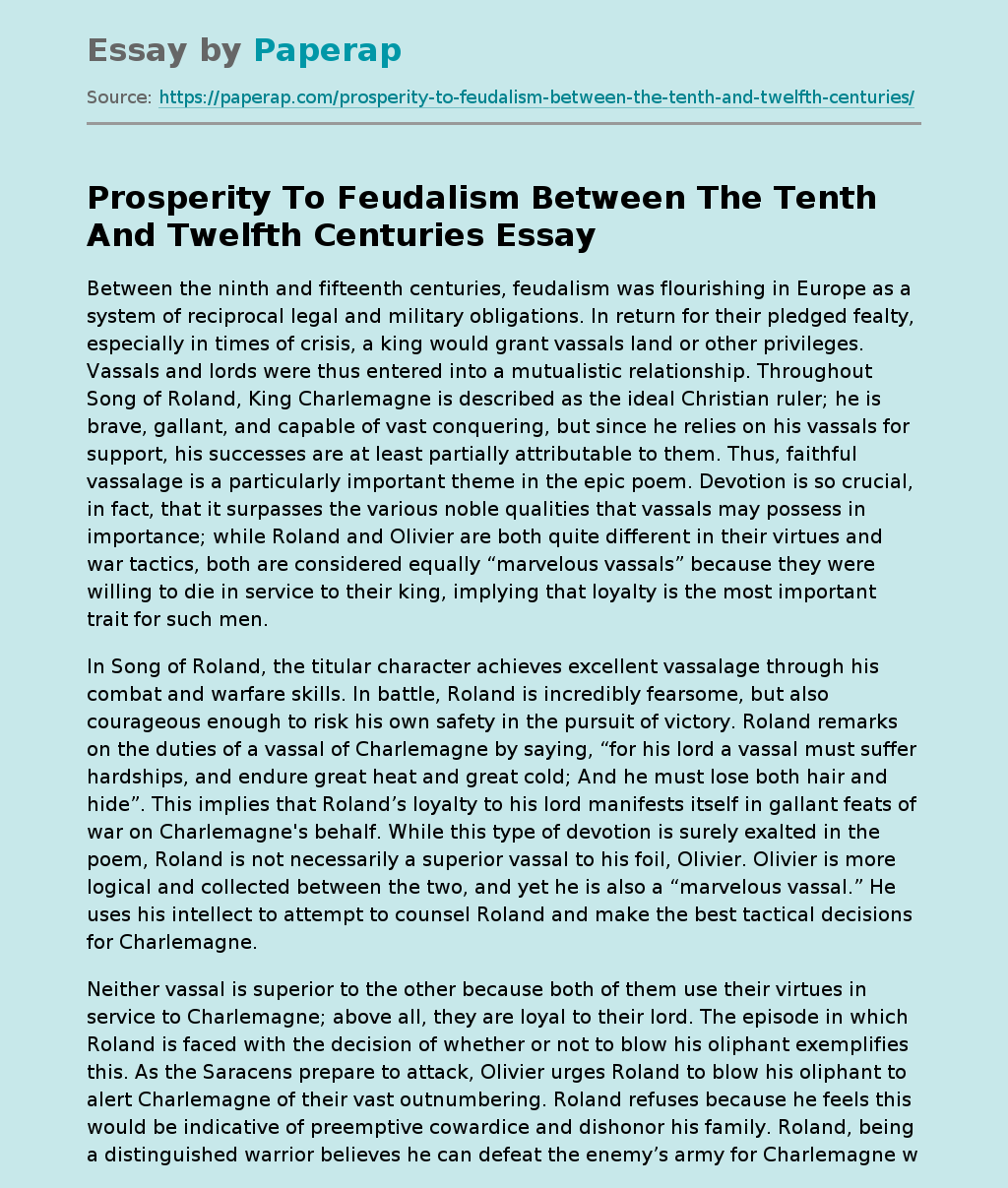Prosperity To Feudalism Between The Tenth And Twelfth Centuries
Between the ninth and fifteenth centuries, feudalism was flourishing in Europe as a system of reciprocal legal and military obligations. In return for their pledged fealty, especially in times of crisis, a king would grant vassals land or other privileges. Vassals and lords were thus entered into a mutualistic relationship. Throughout Song of Roland, King Charlemagne is described as the ideal Christian ruler; he is brave, gallant, and capable of vast conquering, but since he relies on his vassals for support, his successes are at least partially attributable to them.
Thus, faithful vassalage is a particularly important theme in the epic poem. Devotion is so crucial, in fact, that it surpasses the various noble qualities that vassals may possess in importance; while Roland and Olivier are both quite different in their virtues and war tactics, both are considered equally “marvelous vassals” because they were willing to die in service to their king, implying that loyalty is the most important trait for such men.
In Song of Roland, the titular character achieves excellent vassalage through his combat and warfare skills. In battle, Roland is incredibly fearsome, but also courageous enough to risk his own safety in the pursuit of victory. Roland remarks on the duties of a vassal of Charlemagne by saying, “for his lord a vassal must suffer hardships, and endure great heat and great cold; And he must lose both hair and hide”. This implies that Roland’s loyalty to his lord manifests itself in gallant feats of war on Charlemagne’s behalf.
While this type of devotion is surely exalted in the poem, Roland is not necessarily a superior vassal to his foil, Olivier. Olivier is more logical and collected between the two, and yet he is also a “marvelous vassal.” He uses his intellect to attempt to counsel Roland and make the best tactical decisions for Charlemagne.
Neither vassal is superior to the other because both of them use their virtues in service to Charlemagne; above all, they are loyal to their lord. The episode in which Roland is faced with the decision of whether or not to blow his oliphant exemplifies this. As the Saracens prepare to attack, Olivier urges Roland to blow his oliphant to alert Charlemagne of their vast outnumbering. Roland refuses because he feels this would be indicative of preemptive cowardice and dishonor his family. Roland, being a distinguished warrior believes he can defeat the enemy’s army for Charlemagne without the need for his assistance. While Olivier initially believed that personal honor was subordinate to winning the victory, and therefore the oliphant should be blown, he decides near the end that it would be best to preserve their honor and avoid calling for help.
Roland believed that personal honor was more important than victory, but likewise changes his mind and chooses to blow the oliphant later in the battle. This reveals that a good vassal’s opinions and tactics vacillate depending on the situation and how their lord might be best served, and also that the ideal traits of a vassal are ambiguous, and perhaps ultimately unimportant. Neither Olivier nor Roland are correct or incorrect in their battle tactics. Rather, they are exalted for their unanimous faithfulness to Charlemagne and their commitment to doing what is best for his interest. Roland dies a martyr’s death at the hand of the Muslims. Even though he is not victorious in battle, he is a hero along with the men that fought beside him because his allegiance to his lord never wavered.
Prosperity To Feudalism Between The Tenth And Twelfth Centuries. (2021, Dec 13). Retrieved from https://paperap.com/prosperity-to-feudalism-between-the-tenth-and-twelfth-centuries/

